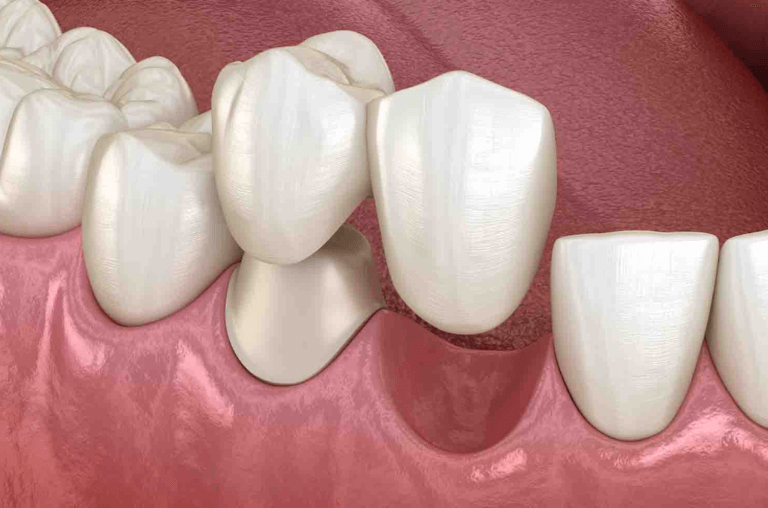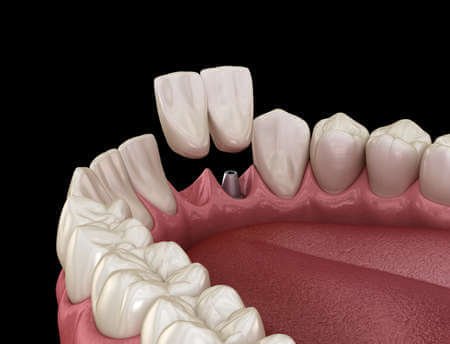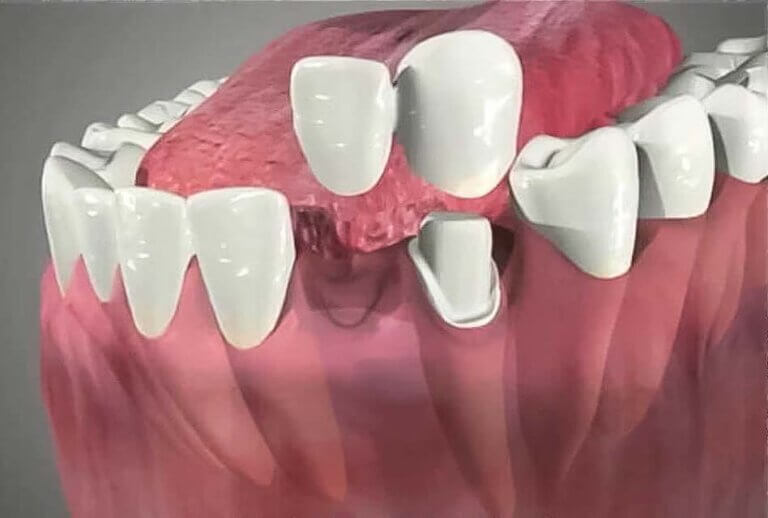Cantilever Dental Bridge

What Is A Cantilever Dental Bridge?
A cantilever dental bridge is a type of dental prosthetic designed to replace a missing tooth. Unlike traditional bridges, which are supported by teeth on both sides of the gap, a cantilever bridge is anchored to just one adjacent tooth. This makes it an ideal option for situations where only one neighboring tooth is available for support.
Cantilever bridges can restore both the appearance and functionality of your smile, allowing you to chew, speak, and smile confidently. Before deciding on whether A Cantilever Dental Bridge are right for you, there are some things you should know:
- Who Needs A Cantilever Dental Bridge?
- Benefits Of A Cantilever Dental Bridge
- Alternative Treatments To Cantilever Dental Bridge
- How Much Does A Cantilever Dental Bridge Cost?
- Steps In The Cantilever Dental Bridge Procedure
- Frequently Asked Questions About Cantilever Dental Bridges
If you have any further questions about A Cantilever Dental Bridge or other dental services offered at Atlas Dental, please contact us.

Free phone consultation
Are you missing teeth and have questions about Dental Bridges? Schedule a free phone consultation with our GTA dentist.

5 star google reviews
Our patients love us! See why people are choosing Atlas Dental for Dental Bridges.

Book Emergency Bridge visit online
Have a problem with your Dental Bridge? Book An Emergency Dental Appointment Online.
Who Needs A Cantilever Dental Bridge?
A cantilever bridge may be the right solution if you:
- Have a single missing tooth with only one adjacent healthy tooth available.
- Prefer to preserve neighboring teeth, as a cantilever bridge doesn’t require prepping both adjacent teeth.
- Have minimal bone loss, ensuring a stable foundation for the bridge.
- Are unable to undergo dental implant surgery due to medical or personal reasons.
- Want a more affordable option compared to dental implants.
Always consult your dentist to determine if a cantilever dental bridge is the best treatment for your specific case. If you have further questions about Cantilever Dental Bridges, please contact us.
Benefits Of A Cantilever Dental Bridge
A cantilever dental bridge offers several distinct advantages for patients seeking to replace missing teeth:
- Preserves adjacent teeth: Unlike traditional bridges, a cantilever bridge does not require the preparation of both adjacent teeth.
- Non-surgical: A great alternative for patients who can’t or don’t want to undergo dental implant surgery.
- Aesthetic enhancement: It fills in gaps and restores a natural-looking smile.
- Restored function: Helps regain normal chewing and speaking abilities.
- Cost-effective: Less expensive than dental implants.
- Quicker treatment: Fewer appointments and a shorter recovery period compared to implants.
As with any dental procedure, it’s essential to consult with a skilled and experienced dentist to determine whether a cantilever dental bridge is the right option for your specific situation. If you have further questions about Cantilever Dental Bridges, please contact us.

Alternative Treatments To Cantilever Dental Bridge
Here are some alternative treatments you might consider if a cantilever dental bridge is not the right choice for you:
- Dental Implants: A more permanent solution but involves surgery and higher costs.
- Traditional Dental Bridges: Supported by teeth on both sides of the gap.
- Maryland Bridge: Less invasive but only suitable in specific situations.
- Removable Partial Dentures: More budget-friendly but less stable and comfortable.
Consulting with your dentist is important to receive personalized recommendations based on your unique situation. If you have further questions about Cantilever Dental Bridges, please contact us.
Cost of Dental Bridge
The price of a Dental Bridges will depend on the number of pontics and retainer. For example, a 3-unit bridge, for example, would cost $1234+550+1234 plus dental lab fee (approximately $600), which would equal $3618. The codes relevant to dental bridges in the Ontario Dental Association’s Suggested Fee Guide appear as follows:
Pontics, Porcelain/Ceramic/Polymer Glass
- 62501 – Pontics, Porcelain/Ceramic/Polymer Glass Fused to Metal: $550 + Dental Lab Fee
Retainers, Porcelain/Ceramic/Polymer Glass
- 67201 – Retainer, Porcelain/Ceramic/Polymer Glass: $1234 + Dental Lab Fee
Dental bridges are sometimes considered a supplementary service by dental insurance plans and may or may not be covered by your dental insurance. Be sure to find out from your dental insurance plan provider how much you are eligible for before going ahead with dental treatment. Your dentist can help you submit an predetermination to your dental insurance.
For patients without dental insurance, Atlas Dental is pleased to offer dental financing through iFinance Dentalcard. Affordable payment plans start at 7.95% for terms of 6 months to 6 years. To learn more about Dentalcard dental treatment financing, follow this link.
Steps In The Cantilever Dental Bridge Procedure
Here’s an overview of the typical process of getting a cantilever dental bridge:
- Consultation: Your dentist will assess your oral health and decide if a cantilever bridge is suitable for you.
- Tooth Preparation: The adjacent tooth is prepared by removing a small amount of enamel.
- Impressions: Dental impressions are taken to create a custom bridge that fits perfectly.
- Temporary Bridge: A temporary bridge may be placed while your permanent one is being made.
- Final Fitting: Once ready, the permanent bridge is cemented in place.
- Aftercare: Follow your dentist’s instructions to maintain the longevity of your bridge.
By following these steps in close collaboration with your dentist, you can expect to achieve a restored smile that enhances both your appearance and your overall quality of life. If you have further questions about Cantilever Dental Bridges, please contact us.

Frequently Asked Questions About Cantilever Dental Bridges
- How is a cantilever dental bridge different from a traditional bridge?
A cantilever bridge is supported by a single abutment tooth, unlike traditional bridges that require support on both sides. It’s often used when only one natural tooth is available for support.
- How long does a cantilever dental bridge last?
With proper care, a cantilever dental bridge can last 5-15 years or longer. Regular dental checkups and good oral hygiene are essential to prolong its lifespan.
- Can I eat normally with a cantilever dental bridge?
Yes, but you may need to avoid very hard or sticky foods that could damage the bridge. Your dentist will provide guidance on eating habits to protect your bridge.
- Is a cantilever dental bridge suitable for everyone?
No, cantilever bridges are best for specific cases where there’s only one supporting tooth available. Your dentist will assess your situation to determine if it’s the right option for you.
A cantilever dental bridge can be a great solution for replacing missing teeth when traditional options aren’t suitable. If you have further questions about Cantilever Dental Bridges, please contact us.

